So I try next compilable code:
#include <math.h>
#include <iostream>
#include <algorithm>
#include <vector>
#include "boolinq.h"
float dtSqrt(float x)
{
return sqrtf(x);
}
/// Returns the distance between two points.
/// @param[in] v1 A point. [(x, y, z)]
/// @param[in] v2 A point. [(x, y, z)]
/// @return The distance between the two points.
inline float dtVdist(const float* v1, const float* v2)
{
const float dx = v2[0] - v1[0];
const float dy = v2[1] - v1[1];
const float dz = v2[2] - v1[2];
return dtSqrt(dx*dx + dy*dy + dz*dz);
}
int main () {
float target[] = {1,2,3};
float floats1[] = {1.321f,2.123f,3.333f};
float floats2[] = {1.011f,2.234f,3.555f};
float floats3[] = {1.9f,2.9f,3.9f};
float floats4[] = {1,2,3};
float floats5[] = {1,2,3.123f};
std::vector<const float *> floatsVector;
floatsVector.push_back(floats1);
floatsVector.push_back(floats2);
floatsVector.push_back(floats3);
floatsVector.push_back(floats4);
floatsVector.push_back(floats5);
//stl way
//std::sort(floatsVector.begin(), floatsVector.end(), [&](const float* pointA, const float* pointB) -> bool{
// auto distA = dtVdist(pointA, target);
// auto distB = dtVdist(pointB, target);
// return distA < distB;
//});
// auto stl_point = floatsVector.front();
try {
auto point = boolinq::from( floatsVector )
.orderBy([&](const float* point) -> float{
auto dist = dtVdist(point, target);
return dist;
})
.reverse()
.toVector()
.front();
std::cout << point[0] << " " << point[1] << " " << point[2] << ";" << std::endl;
} catch (std::exception &e) {
std::cout << e.what() << std::endl;
}
std::cin.get();
return 0;
}
having boolinq header this programm compiles quite fast. Yet it fails uncachably! at runtime with some inner vector assertion error:

problem is:
boolinq::from( floatsVector )
.orderBy([&](const float* point) -> float{
auto dist = dtVdist(point, target);
return dist;
}).toVector();
is empty vector.
uncommenting stl code makes programm work as expected!
futher more simple point reordering makes it work as expected:
float floats1[] = {1,2,3};
float floats2[] = {1,2,3.123f};
float floats3[] = {1.321f,2.123f,3.333f};
float floats4[] = {1.011f,2.234f,3.555f};
float floats5[] = {1.9f,2.9f,3.9f};
A really strange bug...
btw next code:
#include <math.h>
#include <iostream>
#include <algorithm>
#include <vector>
#include "boolinq/boolinq.h"
struct Point {
float X;
float Y;
float Z;
Point() : X(0), Y(0), Z(0) {}
Point(float X, float Y, float Z) : X(X), Y(Y), Z(Z) {}
};
float dtSqrt(float x)
{
return sqrtf(x);
}
inline float dtVdist(const float* v1, const float* v2)
{
const float dx = v2[0] - v1[0];
const float dy = v2[1] - v1[1];
const float dz = v2[2] - v1[2];
return dtSqrt(dx*dx + dy*dy + dz*dz);
}
inline float dtVSqrDist(const Point & v1, const Point & v2)
{
const float dx = v2.X - v1.X;
const float dy = v2.Y - v1.Y;
const float dz = v2.Z - v1.Z;
return dx*dx + dy*dy + dz*dz;
}
int main () {
auto target = Point(1,2,3);
auto pointA = Point(1,-2,3);
auto pointB = Point(1,2,3);
std::vector<Point> pointsVector;
pointsVector.push_back(pointA);
pointsVector.push_back(pointB);
//stl way
std::sort(pointsVector.begin(), pointsVector.end(),
[&](const Point & pointA, const Point & pointB) -> bool{
auto distA = dtVSqrDist(pointA, target);
auto distB = dtVSqrDist(pointB, target);
return distA < distB;
});
std::reverse(pointsVector.begin(), pointsVector.end());
auto stl_point = pointsVector.front();
std::cout << "stl point: " << stl_point.X << " " << stl_point.Y << " " << stl_point.Z << ";" << std::endl;
//try {
auto points = boolinq::from( pointsVector )
.orderBy([&](const Point & point) -> float{
auto dist = dtVSqrDist(point, target);
return dist;
})
.reverse()
.toVector();
auto point = points.empty() ? Point() : points.front();
std::cout << "boolinq point: " << point.X << " " << point.Y << " " << point.Z << ";" << std::endl;
//} catch (std::exception &e) {
// std::cout << e.what() << std::endl;
//}
std::cin.get();
return 0;
}
Produces:
stl point: 1 -2 3;
boolinq point: 0 0 0;
What is wrong with my code? It looks alike orderBy examples thay provide on main boolinq page...?